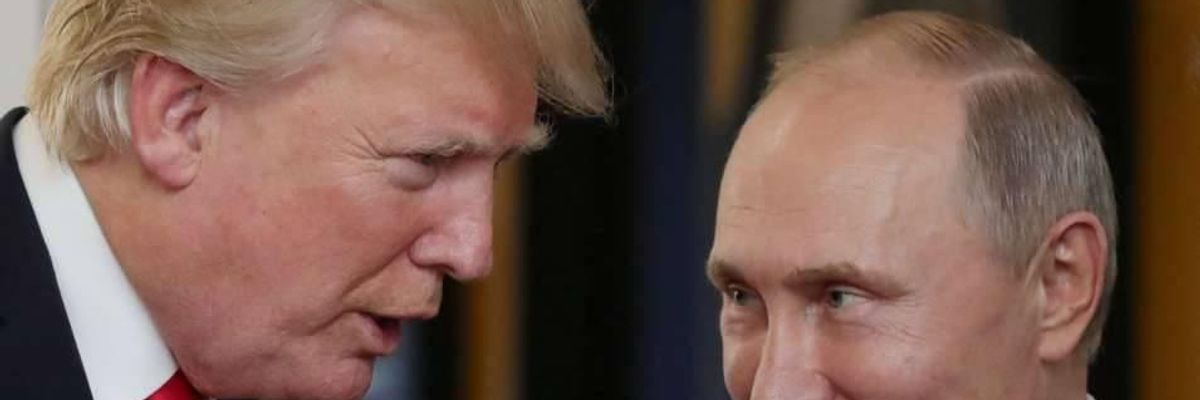Elected officials and experts from more than 40 countries have sent an open letter to U.S. President Donald, Russian President Vladimir Putin, and various other world leaders imploring them to preserve the Intermediate-range Nuclear Forces (INF) Treaty, from which the Trump administration has said it plans to withdraw, despite warnings that doing so "would be stupid and reckless."
"Conflicts over the INF Treaty should be resolved through the treaty, not by abandoning it... They cannot be resolved by elevating nuclear threats and ratcheting up the arms race."
--Christine Muttonen of Austria, PNND
While welcoming progress on denuclearizing the Korean peninsula, the letter (pdf) emphasizes alarm over the "erosion" of the INF Treaty; war games and nuclear weapons development the United States ditching the Iran nuclear deal; and "unresolved conflicts between Russia and the West including over Crimea and Syria and between nuclear armed states in other regions including South Asia and the South China Sea."
The letter calls on the United States and Russia "to refrain from developing and deploying weapons systems that could violate the treaty, and to resolve compliance issues through dialogue and through enhanced work of the Special Verification Commission established by the treaty." It also urges legislators from both nations "to refuse to authorize, or allocate funding for, the development or deployment of weapons systems which might violate the treaty."
Washington--backed by NATO--claims that Russia is violating the collapsing Cold War-era treaty by developing and deploying a ground-launched cruise missile known as the 9M729. Moscow, meanwhile, insists that its weapon is compliant but that U.S. missile defense systems in Europe are not. The Trump administration has said that if a deal can't be reached by Feb. 2, it will begin a six-month withdrawal process.
"Conflicts over the INF Treaty should be resolved through the treaty, not by abandoning it," declared letter signatory Christine Muttonen of Austria, co-president of Parliamentarians for Nuclear Non-proliferation and Disarmament (PNND).
"And other conflicts should be resolved through diplomacy and common security mechanisms such as the United Nations and the Organization for Security and Cooperation in Europe (OSCE)," added Muttonen, who recently served as the president of the OSCE Parliamentary Assembly. "They cannot be resolved by elevating nuclear threats and ratcheting up the arms race."
The message to the world's leading nuclear powers comes amid reports that diplomats from both countries have agreed to discuss the treaty on the sidelines of a U.N. meeting in Beijing this week. It also comes as, under the direction of the Trump administration, the United States has begun production of a new "low-yield" warhead that experts worry will heighten the risk of nuclear war.
Mounting concerns over the Trump administration's nuclear positions--largely influenced by the president's warmongering National Security Adviser John Bolton--have prompted Democrats in Congress to re-introduce a bill that would bar any U.S. president from launching a preemptive nuclear strike. Supporters called it "a simple and effective means of reducing the nuclear threat."
Concerns about the global rising nuclear threat, as the letter and Muttonen noted, are also shared by the Bulletin of the Atomic Scientists. Given that world leaders have failed to adequately mitigate dangers posed by nuclear weapons and the climate crisis, the group revealed last week that the infamous Doomsday Clock remains at two minutes to midnight, signaling that a high risk of global catastrophe has become "the new abnormal."
In line with the demands made by dozens of mayors, parliamentarians, policy experts, and civil society groups in the letter on Tuesday, one of the Bulletin's primary suggestions regarding nuclear weapons is that U.S. and Russian representatives "return to the negotiating table to resolve differences over the INF treaty."

